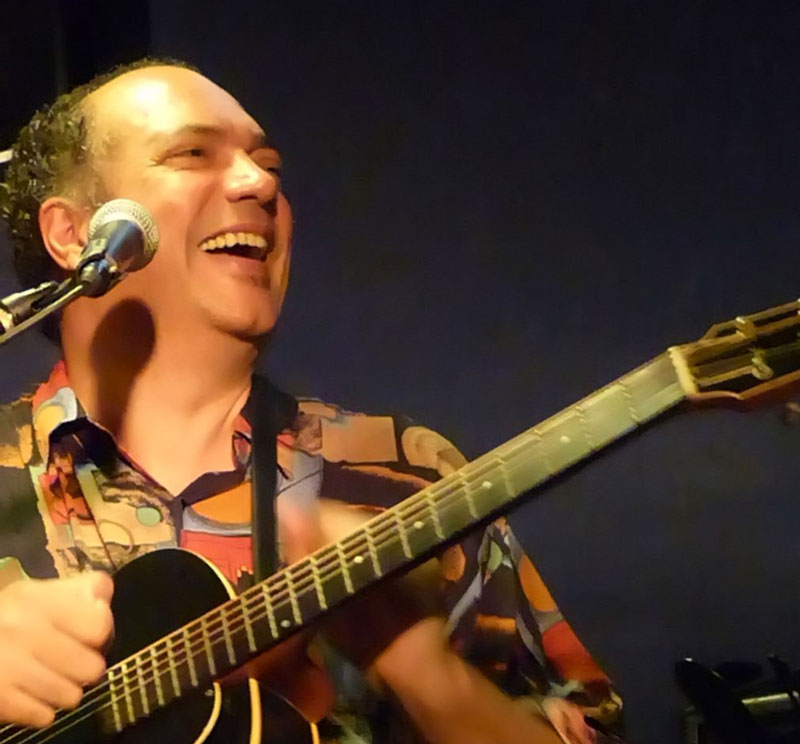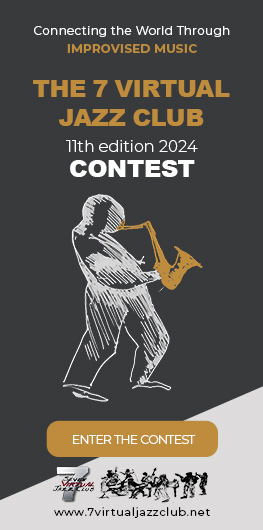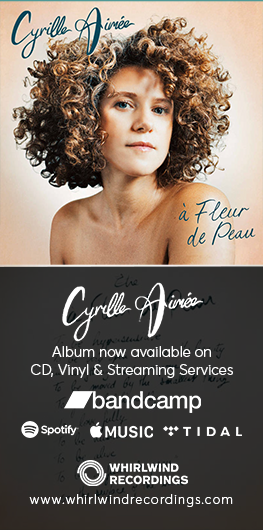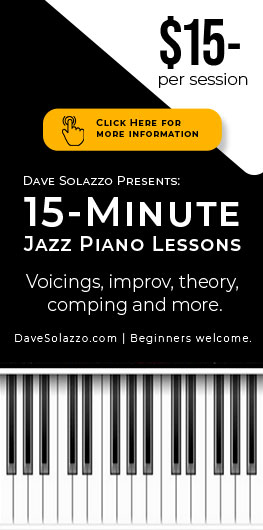From Luton (UK) to Valencia (Spain) in a personal and professional trip that has brought him to find his inner voice after thirty years of playing in important venues as Ronnie Scott’s Jazz Club. Mike McKoy is an Englishman with Jamaican and German roots but with a universal mind, who has focused his work in creating a philosophical message to share with us through jazz and blues melted in a literary idea.
Ludwig Manhattan’s Germaican Blues (Sedajazz Records, 2014) is his latest studio album in which this musician, besides playing the guitar, also shows his ability to write, narrate stories and sing them with his pure jazz man soul. This album and audiobook, is modest but meaningful. With this project, jazz lives to create a wide space for the story to be developed.
The attractive and captivative atmosphere of this CD is shaped by the musicians who accompany Mike McKoy in his new adventure: the great trombonist Toni Belenguer, the versatile bassist Mark Baker, pianist Vicent Colonques and the harmonica player Ignacio Aguilar. However it’s also, the audio-book that provides the listener/reader a visual experience thanks to the illustrators Luis Demano and David Salvador, who had designed the books images and projections that are shown during the concerts.
All this makes Ludwig Manhattan’s Germaican Blues a complete experience to enjoy music, literature and illustration and proves that storybooks are not just for children.
Marta Ramón: How did the idea for the project come about?
Mike McKoy: American author Mary Flannery O’Connor wrote a short story whose title resonates with me: “The Life You Save May Be Your Own”. Although I didn’t realize it at the time, this project was a response to my own visceral need for renewal and growth.
The catalyst was an opportunity to perform a tribute to Nat ‘King’ Cole with a big band about five years ago. I had chosen the repertoire, the band sounded great, and the experience was thrilling. Nevertheless, I found myself feeling quite despondent and began to examine why. I’ve spent several years imitating the phrasing of my heroes in order to learn the jazz language, but I find no honor in trivializing their art for the sake of light entertainment. I don’t want any part in the sordid proliferation of tribute acts in jazz.
I needed to articulate my own experience, and I wanted to express this in a way that is uplifting, positive and fun. I began to pen lyrics that raise questions of morality and ethics, and I wrote some melodies over my favorite chord progressions. I wanted to combine the songs into a coherent whole, so a kind of ‘concept album’ with narrative seemed like the best way to go.
My inspiration was the character from Frank’s Wild Years and Big Time by Tom Waits. I decided to use my own dual heritage as a metaphor for a journey to self-reliance, happiness and mutual understanding.
MR: At what point in your musical career did you realize that you wanted to find your own voice and way to express yourself?
MM: When I sang with the big band, it became abundantly clear to me that there is money to be made as an impersonator. That’s not for me. I immediately made the decision to start writing and sought advice from Michael Steinman (of the blog JAZZ LIVES), who recommended reading Ralph Waldo Emerson’s Self-Reliance. The central message of this essay has helped me more than anything else. It can be summed up in two words: trust yourself.
I see music not as a career but as a discipline. After reading Emerson, I began see music as a vehicle for my own inner voice. I also began to recognize the high price of using someone else’s, tantamount to silencing and invalidating oneself.
Music is fun but not frivolity. It’s also a path to knowledge of self and to emotional honesty. Unless I pursue this path without pretense, I feel I am betraying myself, my family and my community. For example, in spite of my parents’ fondness for them, I once viewed Louis Armstrong and Nat ‘King’ Cole as decidedly ‘uncool’. This was very much an adolescent association of mine, which passed as soon as I began to appreciate Louis’s and Nat’s significance in the struggle for social justice in a radicalized world.
I see social justice as a matter of dignity and honor. Finding my own voice is about finding my own way to uphold and defend those values here and now – without becoming a self-gratifying individualist who doesn’t give a fuck about others, without repressing my own opinions or beliefs, without relying on anyone else for direction, and without excessive regard for whatever materials – words and sounds – I happen to use.
MR: You are so good at imitating your idols’ playing, and you don’t try to hide it. Indeed, you always explain it. Do you think that it is the first stage to become a good musician?
MM: Yes, I do. Imitation is a means to an end, the ultimate end being complete mastery of the core language. Like a lot of musicians, I study and transcribe the language of the greats, and I can scat dozens of famous solos note-for-note, but I don’t do it in public. The value of imitation is that it shows you what technical study you need to do in order to develop facility. The aim is to increase freedom of self-expression.
There is an interesting story behind the title of a great book by Gene Lees, You Can’t Steal A Gift. When Phil Woods had been accused of ‘stealing Charlie Parker’s music’, Dizzy Gillespie told him, “You can’t steal a gift. Bird gave the world his music, and if you can hear it, you can have it.”
My goal as a musician mirrors what I seek as a listener. What matters most to me as a listener is Beauty. I perceive this as both ‘message’ and ‘feel’. Whether or not a performance happens to be my cup of tea doesn’t affect my ability to appreciate its content, but I have very little interest in displays of technical facility alone.
Playing jazz is about interaction, about intuitive choices triggered in the moment by the musical situation. Because of the vast amount of time and effort involved in learning to play intuitively, I think it’s crucial to make wise choices about what and why to imitate. Sometimes it’s wisest not to do so at all.
MR: Why do you think other musicians don’t like comparisons and try to mask their playing similarities with the big names?
MM: I can think of instances where comparison of one musician’s playing with another’s might tend to distract from the message in their work, but trying to mask it has more to do with branding than with beauty. That may be a legitimate strategy for differentiating one product from another in a competitive market, but I don’t like to think of jazz musicians capitulating to those forces. In my opinion, originality is overrated. Obsession with it is just another kind of conformism. None of my heroes hides their influences, and each of these is a conflation of other people’s playing. Why hide it? I think it’s something to celebrate, share and be proud of.
MR: Why did you choose literature as the best option to mix with your music?
MM: Among my treasured vinyl collection are several masterpieces that perfectly combine spoken word and jazz. On the other hand, their successful integration isn’t easy to achieve. I chose this option because I found myself in the fortunate position of having all the resources needed to make the idea work, i.e. the listening skills, musicianship and affinity of a great band. My prime objective was to find a way to express ideas that I normally keep under wraps, but I wanted to do so without losing the audience along the way. I just think of it as storytelling.
MR: I feel that your work is quite educational. Was that one of your objectives?
MM: Yes, it was. It’s symbolic, and was written with older teens in mind. The working title was Cultural Chameleon, referring to the ability to blend in and adapt to one’s surroundings. I drew inspiration from my parents’ struggle against taboo and stigma, but I wanted to go beyond visible layers of culture such as race, ethnicity and gender, and touch on diversity that often goes unnoticed because it’s hidden in plain sight. I think it’s folly to define oneself by membership of a social or cultural group, and holding on to anger over injustice or infringement of that group’s rights is not the best use of the heart. Besides, no-one’s life is a complete bed of roses.
MR: Reading your book it feels like society is sick. Do you think that the jazz music world is ill as well, I mean, with a lot of “copyists” and but not too many real voices?
MM: I’ve seen some of what musicians are struggling with. I know what time it is. But I have confidence in the musicians’ creative vision. I’m inspired by dialogue between the present and the past. I’m an optimist and a romantic, and I believe that collaboration will ensure that jazz survives this economy. I don’t think the jazz music world is sick. It’s just malingering.
MR: What can we find in your concerts?
MM: There are no drums; double bass and acoustic guitar drive the rhythm in the classic style of 1930’s small-group swing. Keyboards sweeten several songs, and trombone counter lines complement the baritone vocals. When the trombone wails, the exuberant joy of jazz fills the room. During the reading of the narrative, the text and lyrics (plus a translation) are projected onto a backdrop along with some original illustrations. And, of course, there is improvisation from the band – including some judicious use of didgeridoo.
MR: Do you think that the literature is necessary to understand blues/jazz?
MM: I wouldn’t say that it’s necessary, but I would say that it’s useful. Critical thinking and inferential skills will help listeners go beneath the surface and find meaning, understand and empathize. The music can be appreciated instantly and on several levels, whereas the narrative contains abstract ideas which may require reflection. The audience for jazz is relatively small, but I think it’s one that’s willing to concentrate in order to experience – hopefully – a sublime translation of feelings into sounds.
I wouldn’t want to condescend to audiences by using literature as a gimmick (the thought of which makes my eyes roll heavenward), but I do want to be a little bit adventurous. Graphic illustrator David Salvador has created some wonderful visual elements to reinforce the message and envelop the audience. I think metaphor is usually apparent to those who have sophistication, but it needn’t be offensive to those who lack it.
MR: One of your main projects is a bossa nova album. Why do you feel appealed by Brazilian music? Give me the recording info please (name, date, recording company)
MM: The Getz/Gilberto recordings were the soundtrack to my teens. Listening to Brazilian music was an exotic thing to do where I grew up, and that alone was reason enough for me to want to do it. It was a form of escapism. The lyrics resonated with me in very much the same way as conscious 70’s soul and reggae.
Once I’d learned my way around a guitar, I got to see João Gilberto perform solo and immediately began to study his way of phrasing and controlling the rhythmic pulse. I’ve had the pleasure of singing and playing bossa nova with some wonderfully lyrical tenor players such as John O’Neill, Jim Tomlinson (who sounds uncannily like Stan Getz) and Bobby Wellins, with whom I recorded the CD Mike McKoy Swings to the Bossa Nova (Zephyr, 2002). It was recorded live at the Pizza on the Park with some of the finest musicians in the UK.
MR: You have toured a lot as a musician since you started your professional career, but now you are established in Valencia and don’t travel too much, what changed your perspective about music and life?
MM: I have a family to provide for, so I can’t funnel all my energies into full-time music. I have all I need, and I’m happy and grateful. Living amidst elegance inspires me to live well. I try to do that every day, taking every opportunity to practice, study and learn.
MR: You played in the emblematic jazz club Ronnie Scott’s.
MM: That’s right. Pete King ran the club at the time. My sextet played opposite Elvin Jones Jazz Machine for a week. I even lead the house in a round of ‘Happy Birthday’ on the night of Elvin’s 70th. We made ‘a powerful impression’, according to the press – and I treated myself to a CD box set of Wes Montgomery’s Complete Riverside Recordings with my share of the proceeds!
MR: You’re an anecdotes box, any good one that still makes you laugh?
MM: I have an abundance of anecdotes about travelling to and from gigs, but my favourite stories are all about listening in awe to the formidable British jazz musicians I’ve had the chance to play with. There is one story that makes me smile. It happened at one of the major London hotels, where we were playing a Jazz Brunch. A sharply-dressed young man, who was wearing sunglasses indoors, sat right in front of the band and started talking rather loudly while the bassist was taking a solo. Saxophonist Bobby Wellins leaned towards him and – gently, but firmly – ‘shushed’ him. It was Justin Timberlake.
Last modified: July 15, 2018











